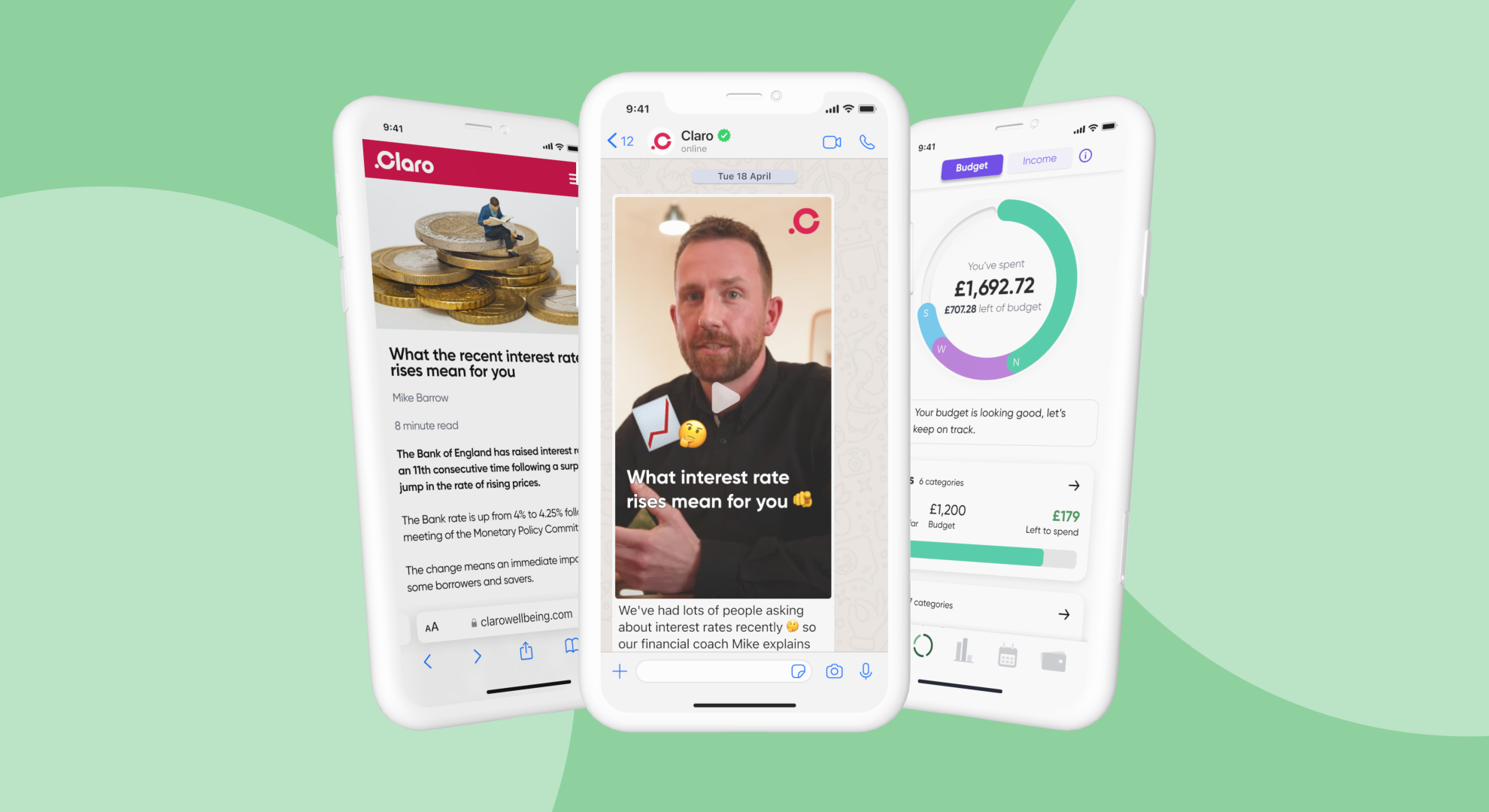6 min read
Should employers acknowledge Blue Monday?
Blue Monday (15 January) has a mixed reputation. But there’s still value in using the day to raise awareness of mental health and wellbeing...

Financial coaching is continuing to increase in popularity, particularly during the ongoing cost of living crisis and the uncertainty that surrounds it. But for the uninitiated, what does financial coaching actually entail? And what are its benefits?
To gain some expert insight, we sat down with two of Claro Wellbeing’s in-house financial coaches, Mike Barrow and Stacey Lowman. With decades of experience and first-hand practice in financial coaching, they generously shared their unique approaches to their craft.
Mike: “Financial coaching involves looking at your situation a little bit more holistically compared to financial advice. You tell your coach the interests or the goals that you have and where you're trying to get to, while looking at where you're at now. Then, we'll look at some options for getting you towards those goals, some of the benefits and drawbacks of those options, some of the questions that you have and I’ll then handhold as much or as little as is necessary to get you along the way.
“This can be over a single session or many sessions, getting you to the point where you’re confident that you’re able to then go away and make those active decisions yourself. You're provided with life skills and finance-related skills that mean that once our conversations are over, you're able to continue and you don't necessarily depend on me.”
Stacey: “I like to think of financial coaching as a tool and relationship to support you in building a clearer, more productive, more constructive and happier relationship with money. That can mean improving your financial literacy, financial knowledge and education around finances and different areas of money management, but it can also be very behavioural. So identifying habits that you have and the impact that those habits and behaviours have on your money management, and how you might go about changing those behaviours.
“It can also be really emotional. Which emotions do you attach to money? Why might that be? How has that come about? Is that a helpful emotion? Is that an unhelpful emotion? Is it supporting you? Is it holding you back financially? It’s about building that awareness around those emotions and then reframing them with various exercises so you can have a happier relationship with money. You can work with a financial coach towards a specific financial goal, or to generally just have a better understanding and awareness of your relationship with money and through that exploration, identify specific goals thereafter that you then want to work towards.”
Mike: “Financial advice is very specific in what it does and what advisors recommend. For instance, ‘You should do specifically X, Y and Z with these products that I'm recommending and selling to you, so pay me commission and then off I go and do that for you’. And there's absolutely nothing wrong with that. The industry does have a very important purpose for the right individual, but it’s very much ‘You tell me your problems, I will sell you a solution and I'll do it for you’. So you may end up better off financially if things go well, but often don’t learn anything along the way.
“With financial coaching, no one is doing anything for you or making a specific recommendation, it's about exploring your situation together. We would discuss some of the benefits and drawbacks of your options, the extra considerations and why you might want to (or not) consider something, and offer a soundboard for your questions. This ultimately provides you with the confidence to then go away and make those decisions yourself.”
Stacey: “A financial advisor traditionally makes recommendations. So you might go to a financial advisor and say, ‘Hey, I've got this amount of money, I'm this age at this stage of my life, these are my goals, what should I do?’. Then the advisor would go away, assess your situation, and then come back with recommendations and then they might implement that plan for you.
“A financial coach never recommends. A financial coach brings out the answers in you and helps you build your own clarity and awareness around your relationship with money and what financial plan you want to go and implement yourself.”
Mike: “First of all, being a good listener. I like to help as much as I can and sometimes just having two ears and one mouth (i.e. listening twice as much as you speak) can be a big help because anything that you say should be very individualistic to that person. You don't want to just speak unnecessarily about generalised topics. If there's a chance to be able to relate something to someone individually, then all the better.
“Also being empathetic is important. All of us have a certain amount of bias to our own situation, whether that’s believing everyone thinks similarly to us or has a similar situation. But it's just obviously not true. So being able to have empathy is important. Empathy and sympathy often get confused, but with empathy, I’m asking how I can genuinely put myself in your shoes and understand things from your situation. If I'm guessing the way you feel or I'm guessing what your situation is, it's not really going to work. So the skill of being empathetic and being able to genuinely see the world through someone else's eyes and through their own biases, interests, habits and nuances is a really good skill to have.
“Your history and background also help. For example, many years ago I was terrible with finances. I've been in all the situations that I speak about with my coaching clients. There's no need to pretend to know how they feel and guess what they're going through because I've gone through most of it myself, so I know firsthand what it feels like for the majority of my coaching clients.”
Stacey: “It's really important that the financial coach has a certain level of knowledge and education around finances to be able to confidently share the features, pros, cons, costs and benefits of any specific financial tools or products that clients are considering using to help them make smart decisions with their money.
“Then from a coaching perspective, they need to support you in building awareness and asking questions, observing, listening and noticing things to help you build the awareness around your relationship, behaviours and influences regarding money. They support you in building that clarity around the behavioural and emotional aspects of money so then you can work on changes you might want to make based on that awareness.”
Mike: “A coaching session would typically start with a polite introduction - ‘Hello. How are you doing? How's the weather?. We would then go through your current financial situation and what we call a ‘net worth table’. This shows us your assets, what you own, your liabilities and what you owe. People aren't always aware of these things which makes it very hard to make any changes or tackle any challenges. The first part of it is analysing your situation and from there, and it becomes very, very obvious where there are some potential gaps for improvement.
“Now, ideally, the coaching clients themselves will have an idea of this. They'll come to us with those pain points. If not, then our job as a coach can be to nudge (but never recommend or force anything) where there might be some room for improvement. From there, we'll have maybe one to three areas to look at and we'll deep-dive into them, bearing in mind the client’s financial knowledge and how close they are to their goal. For example, with buying a first property, we’ll look at things like - are they familiar with a lifetime ISA? How much have they saved? Are they aware of the current property prices? What loan to value ratios are? All these things will let me know where they are in the current journey, and then we can start exploring all the necessary information and how we can apply it to their situation.
“Eventually, it will always come back full circle to a point of how we can put this into actionable steps, creating forecast projections, monthly contributions and how long it’s going to take. We can basically turn what was once a pain point into a bunch of ideas and then eventually into a financial plan.”
Stacey: “You’re likely to start with specific reasons as to why you might have initiated that coaching session. Is there a specific financial goal you want to achieve or maybe you're not happy with your current situation and you want to improve it. You might have an idea of what those goals are to help you move forward, or you're looking for a coach to help you identify these goals. Really getting clarity on what your goals are or might be is important.
“Then we will build an understanding of your current situation. What's your current relationship with money? Which things are good that you're already doing? Which things might be holding you back? It’s good to build a foundation of awareness of your current financial situation. Once we know where you are and where you want to get to, then we’ll look at the options that you have for moving forward. We’ll explore various different plans that you might look to put in place and look at the pros and cons of those.
“Then, we’ll support you with the information, education, awareness, habit changes, behavioural and emotional considerations you might need to incorporate into your chosen plan to give you the motivation and as good a chance as possible for achieving those goals. If we go on to have more than one session, we’ll build some accountability into the relationship as well, seeing how the coach can support you in ensuring you feel able and motivated to actually implement those goals and continue working towards them."

6 min read
Blue Monday (15 January) has a mixed reputation. But there’s still value in using the day to raise awareness of mental health and wellbeing...

4 min read
Ever wished you had a money-whiz friend you could ask anything, as often as you like?

7 min read
Millions are being impacted by financial stress. Yet, until now, workers in frontline occupations have not been able to benefit from educational...